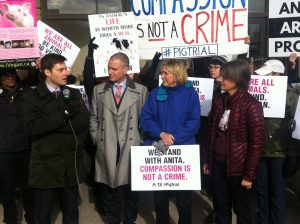The Toronto woman charged with criminal mischief for giving water to pigs destined for slaughter was acting in the public interest.
This was the central defence put forward by self-described vegan lawyers James Silver and Gary Grill in an animal rights case that has made headlines around the world. I was among those in attendance at a packed Burlington courthouse on March 9 to hear their closing arguments. (Justice David Harris will deliver his decision on May 4.)
Anita Krajnc, founder of Toronto Pig Save, became the unexpected voice of the international vegan movement in 2015 after she was criminally charged for giving water to pigs in a stopped truck on a hot summer day. The seeming absurdity of criminalizing an act of compassion cast a spotlight on the treatment of livestock in Canada and turned Ms. Krajnc’s case into something of a cause célèbre: in the wake of her arrest, dozens of “Save” groups sprung up all over the world, and Krajnc herself has drawn support from celebrity activists such as actress Maggie Q and the singer Moby.
Ms. Krajnc’s case raises a whole host of provocative legal issues—issues that Grill and Silver were happy to talk about, both at U of T and during their closing arguments. Interestingly, they are advocating for Krajnc to be cleared not because of the dubiousness of the charge, but because she was “acting in the public interest.” This novel justification (it is not a defence, per se) has rarely, if ever, been used in this type of case—partly because of the inherent risks to the accused. It operates from the assumption that her actions were, in fact, illegal and then asks the court to accept a retroactive justification. Indeed, during a spirited back-and-forth in which Grill compared his client to social justice icons like Gandhi and Nelson Mandela, Justice Harris pointedly asked whether Grill was really asking for Krajnc to also be convicted as those iconic figures were. Grill responded that he hopes for the court to be “on the right side of history” this time.
This justification can only succeed if the court accepts that anti-meat advocacy serves the public good and that, on the question of mens rea, Krajnc not only lacked the intention to cause harm but rather set out to prevent it. Thus, Grill and Silver devoted much of their remarks to the deleterious impacts of the meat industry. They cited its unsustainability and its role as the single largest contributor of global greenhouse gas emissions. They repeated the oft-overlooked science on the dangers of processed meat—according to the World Health Organization, it is a Group 1 carcinogen, as are cigarettes—and repeated Krajnc’s controversial statement that feeding bacon to children is “an act of child abuse.”
Animal Personhood
Perhaps most significantly, there was a lengthy exchange over the legal quality of “personhood” as it applies to animals. Under Canadian law, pigs are legally treated as property, and can be transported for up to thirty-six hours without food or water. According to Grill, such suffering (an expert witness previously testified that pigs in the truck were “in severe distress”) underscores the need for updated laws on humane treatment of animals. Grill argued that the best route towards such treatment was establishing legal personhood for animals, which would afford protections such as being free from cruel treatment.
This idea of “nonhuman rights” has been gaining currency over the past decade, popularized in the academy by ethicists such as Peter Singer and in the courts through some high-profile cases. For example, a writ of habeas corpus was issued in 2015 for two chimpanzees living in captivity in New York State (although the writ was later overturned). In 2008, the Spanish parliament recognized great apes as “non-human hominids” with attendant rights.
In their talk at U of T, Grill and Silver acknowledged that this case was unlikely to result in profound changes to the law. However, by discussing animal personhood in a Canadian courtroom, they hoped to raise awareness about an area of widespread scientific consensus: the extraordinary cognitive abilities and emotional complexities of animals. As neuroscientist Dr. Lori Marino testified during the trial: “Pigs are persons. They are at least as emotionally complex as dogs and as psychologically complex as primates. It sells pigs short to say they are as sophisticated as a human toddler, for they are more complex than that.”
Interestingly, Justice Harris seemed to accept much of this argument, even volunteering his own comparison between the legal status of pigs today and those of women in Canada nearly a century ago. Though careful not to make any legal pronouncements, Justice Harris suggested that, just as the Persons Case brought a long-overdue recognition of women as legal persons, so too might the law eventually “catch up” with the scientific and moral justifications for animal personhood.
The Future of Animal Rights
Outside the courtroom, I spoke to several of Ms. Krajnc’s supporters. Among them was PETA founder Ingrid Newkirk (who flew in from Washington, D.C.), who said that the world should expect “exponentially more such cases in future” and described Krajnc as a hero. “All social justice movements need faces to go with the cause. Not just the victims of oppression and abuse and violence, but also the faces of those who have fought for them.”
I also spoke with U of T alumna Camille Labchuk (JD ’14), who is the Executive Director of Animal Justice, Canada’s only animal law advocacy organization. Ms. Labchuk underscored the landmark nature of the case, particularly how the court was confronted with incontrovertible evidence of the harmful effects of Canada’s red meat industry.
The question of animal personhood was equally important to Ms. Labchuk: “It’s the kind of change that seems inevitable. I feel like this case just helps usher us down that path, in a small way, towards a day when animals are no longer considered mere property without any rights.”







